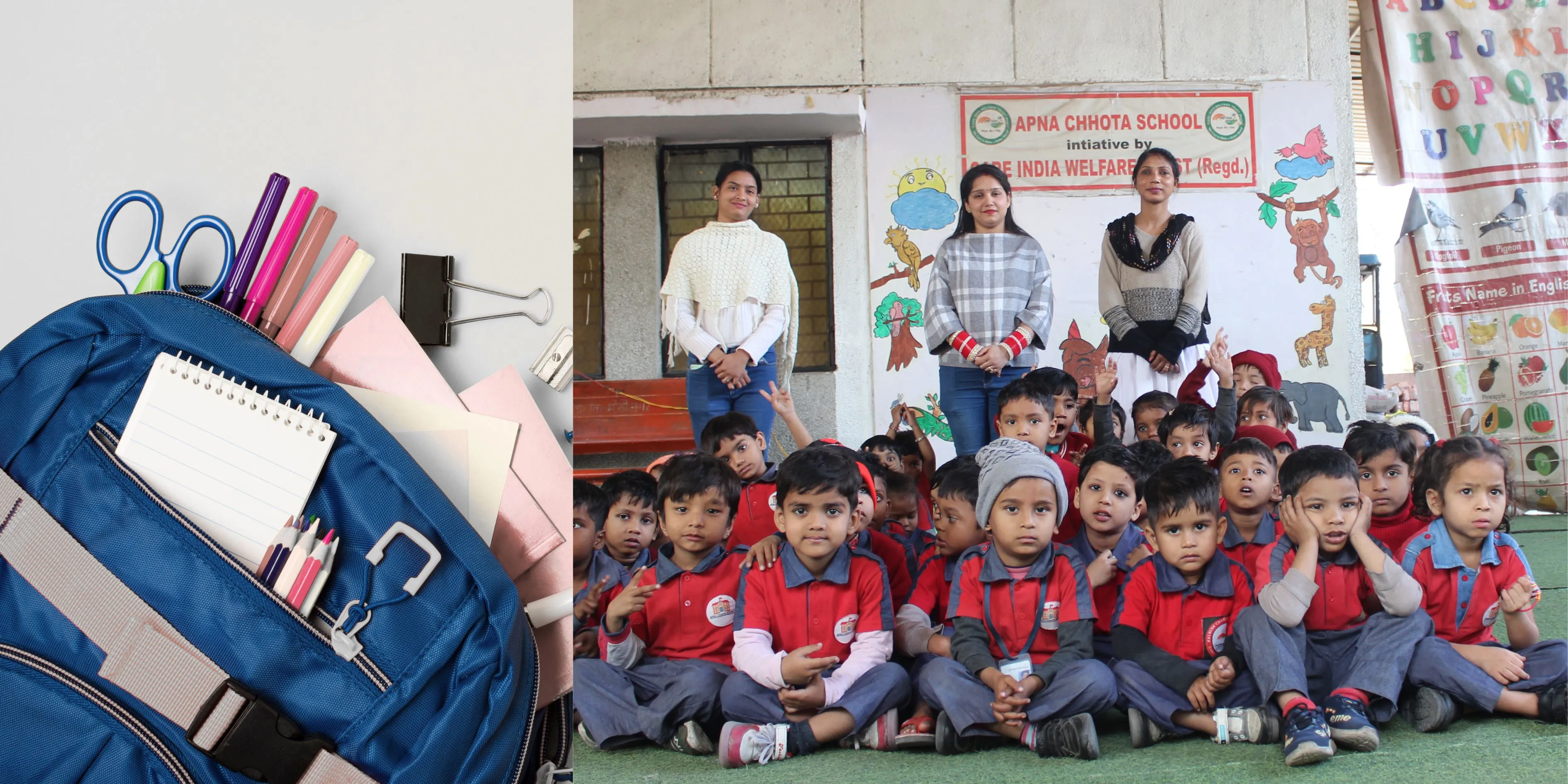Starting School at 2 Years: How Early Education for Slum Children Paves the Way for a Brighter Future
Starting education early, particularly at the age of two, is crucial for a child's overall development. For children living in slum areas and those part of slum education projects, this early exposure to learning becomes even more important. It provides a foundation that helps them catch up with their counterparts in later years, reducing the achievement gap. At Apna Chhota School, we focus on early childhood education in slums in India because it enhances mental, emotional, and social development in children.
Starting school at two ensures that children don’t miss out on critical developmental landmarks. It’s a chance for them to learn foundational skills like language, problem-solving, and social interaction, which ultimately build the confidence they need to succeed in their academic journey. For the life of children in slum areas, this early start can be the key to unlocking a future they might never have imagined otherwise. It also helps in shaping their belief that education is not just an option but a path to a better life.
Care India Welfare Trust: Opening Doors to Quality Education for Slum Children
Care India Welfare Trust believes that every child has the right to quality education, no matter their background or where they live. The establishment of Apna Chhota School in the heart of the slum areas is a direct response to the educational inequalities that exist in India’s most impoverished neighborhoods. Many slum children, also known as slum children meaning those living in poor and underdeveloped areas, never get the opportunity to attend school because of the financial burden it places on their families, or they are forced into work at an early age.
Care India Welfare Trust aims to address this by offering free education of slum children, ensuring that they can learn and grow without the added pressure of financial constraints. The school also provides a nurturing environment where the children feel safe and valued, which is essential for their academic and personal growth. By opening the doors of Apna Chhota School, Care India Welfare Trust is promoting education in slum areas and giving these children a chance to dream, to aspire, and to achieve, breaking the cycle of poverty one child at a time.
Apna Chhota School: Care India Welfare Trust’s Vision to Empower Slum Children Through Education
Apna Chhota School is more than just a building; it embodies Care India Welfare Trust’s vision of empowering slum children through the transformative power of education. The school offers a curriculum that is not only designed to impart academic knowledge but also to foster emotional intelligence, creativity, and social responsibility. The school’s name, "Apna Chhota School," reflects the deep connection the Trust has with the community—it’s "our little school" built with love, care, and a shared belief that education can change lives.
This school provides children with the tools they need to succeed academically while also nurturing their emotional well-being. The Trust's vision goes beyond just teaching subjects; it’s about instilling confidence, resilience, and hope. By making education accessible to children from slum areas, the Trust is providing an equal platform for success and opening up new horizons for these young minds. This educational empowerment can have a ripple effect, impacting not just the child but the entire community.
The Challenges Children in Slum Areas Face When It Comes to Education
Children from slum areas face numerous barriers when it comes to accessing education. Poverty, for one, means that many families cannot afford school fees, uniforms, books, or even basic supplies like pencils and notebooks. In many cases, underprivileged children are sent to work from a young age to help support their families, leaving no time for school. Furthermore, education in slums of India is often affected because slum areas lack infrastructure and safe spaces for children to learn, with overcrowded classrooms, poor sanitation, and high dropout rates.
Social factors also come into play—some parents may not see the value of education or may prioritize immediate survival over long-term educational goals. Additionally, emotional and psychological challenges such as neglect or trauma further hinder the children’s ability to focus and succeed in their studies. The system of slum education in India, if it exists, is often underfunded and ill-equipped to handle the unique needs of slum children. As a result, many of these children are left behind, missing out on the opportunities they need to escape the cycle of poverty.
How Is Your NGO’s School Providing Hope and Opportunities for These Kids?
Apna Chhota School is a beacon of hope for children in slum areas, offering them a chance to break free from the barriers they face. The school provides a nurturing environment where every child is encouraged to learn, explore, and dream. By starting education early, we give children the tools they need to succeed in life. Care India Welfare Trust doesn’t just focus on academics; we focus on holistic development—helping children build life skills, develop emotional intelligence, and foster a sense of community and responsibility. This approach helps children feel valued and empowered.
The school also offers free meals, uniforms, and transportation, ensuring that children are not hindered by financial constraints. Teachers at Apna Chhota School are not just educators—they are mentors who care deeply about each child’s progress and well-being. Through personalized attention and tailored support, we are ensuring that every child has the opportunity to thrive, no matter their background or circumstances.
The Impact of Education on Breaking the Cycle of Poverty
Education is one of the most powerful tools for breaking the cycle of poverty. For children from slum areas, education opens up a world of opportunities that they would otherwise be denied. When a child is educated, they are more likely to secure better job opportunities, which leads to higher wages and a better standard of living. These children also become role models in their communities, inspiring others to pursue education and create positive change.
Education helps to develop critical thinking skills, confidence, and ambition—traits that can help individuals navigate and overcome the challenges of poverty. By providing children from slum areas with access to quality education, we are not just helping them build a better life for themselves; we are helping to lift entire families and communities out of poverty. Education also promotes social mobility, breaking generational cycles of inequality and opening doors to a brighter future.
Success Stories from the Children Who Have Benefited from the School
At Apna Chhota School, every child’s success story is a testament to the power of education and the resilience of the human spirit. Children like Aarti, who started school at the age of three with little confidence, are now excelling academically and emotionally. Aarti’s journey from being a shy, introverted child to a confident, engaged student is a powerful example of what early education can do. Rohit, who came from a family where education was not a priority, is now passionate about science and dreams of becoming an engineer.
These success stories are just a few of the many children whose lives have been transformed by Care India Welfare Trust’s commitment to providing quality education. Each success represents not just an individual achievement but a community victory—proving that when children are given the right resources, love, and guidance, they can overcome any obstacle and create a better future for themselves and those around them.
Ways the Community and Donors Can Get Involved in Supporting the School
Supporting Apna Chhota School and the children it serves is not just the responsibility of the Trust, but of the entire community. There are numerous ways people can get involved and make a difference. One of the most impactful ways is through donations. Monetary contributions go directly toward funding the school’s operations, ensuring that children receive education, meals, and other essential resources. Another way to help is by volunteering. Whether you’re a teacher, mentor, or someone who can offer administrative support, your time and expertise can make a huge difference.
Spreading the word about the school and its mission can also help raise awareness, drawing in more support from individuals and organizations. For those who want to have a direct impact on a child's education, sponsoring a child is a meaningful way to ensure they have the resources they need to succeed. Your involvement, no matter how big or small, can help Apna Chhota School continue to provide life-changing education for slum children, giving them the hope and opportunities they deserve.
Why Age 2 Matters: The Magic of Early Learning
At age 2, a child’s brain is a whirlwind of growth, absorbing information like a sponge. Introducing education at this stage can have profound long-term benefits. Cognitive development is accelerated through exposure to new concepts, vocabulary, and structured problem-solving exercises. These early experiences improve memory, focus, and critical thinking skills, giving children a significant head start in their educational journey. But the impact goes beyond academics. Early learning fosters social and emotional development, helping children navigate relationships, understand emotions, and build empathy. Confidence and independence also blossom at this stage, as children learn routines, follow instructions, and celebrate small achievements.
The joy of discovering something new builds self-esteem and encourages curiosity. Studies show that children who attend quality early education programs are more likely to succeed academically, stay engaged in school, and pursue higher education. Starting early is not just about teaching—it’s about laying the groundwork for a well-rounded, resilient individual capable of facing life’s challenges with confidence and creativity. By understanding the critical importance of these formative years, we can provide children with opportunities that shape their future forever.
Mind Intelligence: Building Bright Young Minds
The early years are critical for language, thinking, and problem-solving. At age 2, children are naturally curious, asking questions, and absorbing everything around them. Structured early education taps into this curiosity, stimulating their minds with activities designed to challenge and inspire. From simple puzzles to interactive storytelling, children develop critical thinking, memory, and creativity. Language acquisition accelerates as they are exposed to new words, expressions, and ideas. This cognitive stimulation doesn’t just help with school readiness—it fosters a lifelong love of learning. By nurturing young minds at this stage, we give them tools to analyze, innovate, and explore confidently.
Every concept learned early becomes a building block for future knowledge. Children develop the mental agility to approach problems thoughtfully, communicate clearly, and express themselves effectively. It’s not just about intelligence; it’s about creating thinkers, dreamers, and problem-solvers who are prepared for the challenges and opportunities of life. Early cognitive growth also positively influences emotional and social intelligence, making children more adaptable, empathetic, and confident in their abilities. When we invest in the brilliance of a child’s mind at age 2, we are shaping the architects of tomorrow.
Social and Emotional Growth: Nurturing Compassion and Confidence
Education at age 2 is not only about academics; it’s about growing emotionally and socially. Being in a group of peers teaches children invaluable lessons about cooperation, sharing, and communication. They learn to navigate feelings, express themselves, and empathize with others—skills that last a lifetime. Early exposure to structured environments helps children build emotional resilience, preparing them to handle challenges, frustrations, and new experiences. Developing these skills early ensures they can form meaningful relationships and navigate social situations with confidence.
Emotional intelligence gained at this stage impacts every aspect of life—from family bonds to friendships and later professional interactions. By learning empathy, patience, and self-awareness, children cultivate a strong sense of self and respect for others. These early social experiences also promote independence. Children begin to trust their abilities, make decisions, and take initiative in small ways, which fosters self-esteem. Early education environments become safe spaces where children explore their emotions, learn problem-solving, and experience success. This combination of social and emotional growth provides a solid foundation for healthy, confident, and compassionate individuals ready to engage positively with the world.



